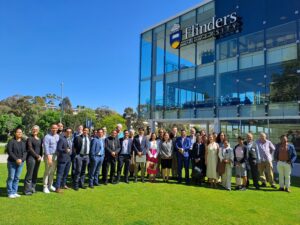Research into the experiences of seasonal workers has uncovered an alarming decline in the wellbeing of Timorese migrants when they return home after stints in the Australian Seasonal Workers Programme.
The Flinders University research is being shared at a symposium with UN, Timor-Leste and Australian government representatives this week.
It shows nearly 87% of Timorese workers could maintain their overall wellbeing while in they were in Australia but this plummeted to just 37% when they returned home.

Lead researcher and says the findings are important in understanding how next steps can be developed to help guide future job and economic policies in Timor-Leste to support migrant workers and their families.
“Our findings show an alarming decline in the economic and health wellbeing of Timorese workers when they go back home,” Associate Professor Saikia says.
“Australia and Timor-Leste can use this research to better understand the experiences of seasonal workers after their work stays in Australia are completed,” he says.
“The research also identified a decline in their knowledge and skills-related wellbeing, dropping from an impressive 99% while they were in Australia to 63% upon their return to Timor.
“Additionally, the research showed that male migrant workers fared better in maintaining their wellbeing than their female counterparts, both while in Australia and after returning to Timor.
“So it is also not surprising to see the research finding that 83% of Timorese workers expressed an intention to return to Australia for future work.”
The research involved surveys conducted with returned migrants and their households in Timor-Leste, as well as workers currently employed in Australia under the scheme which enables Australian agricultural and horticultural businesses to hire temporary workers from Pacific Island nations and Timor-Leste.
Eligible businesses usually recruit workers through the programme for up to 9 months at a time or in longer-term roles which last between one and four years.
Associate Professor Saikia says the main contributing factor to the decline identified by the research was a lack of employment upon returning to Timor, with only 20% of returned migrant workers finding work, leaving a substantial 80% unemployed.

The research is supported by the Department of Foreign Affairs and Trade (DFAT), the Government of Timor-Leste (SEFOPE and Directorate-General for Statistics), and the United Nations Development Programme (UNDP) in Timor-Leste.
A total of 750 workers, including those currently on engagement in Australia and those who had returned to Timor-Leste, were surveyed for the study. To provide a comparative analysis, the survey also included Timorese workers who had returned to Timor after working in South Korea under the Korean Permit System. The complete findings will be published later next year.
The Flinders University symposium is being held at the Bedford Park Campus on Tuesday-Wednesday, September 26-27. Researchers will present their results to a diverse group of stakeholders, including senior policymakers from the Government of Timor-Leste, Australia’s Department of Foreign Affairs and Trade, and delegates from the Northern Territory Farmers Association.
Since its inception in 2008, over 20,000 individuals have participated in Australia’s seasonal workers program. This initiative has since expanded to include residents from Fiji, Kiribati, Nauru, Papua New Guinea, Samoa, Solomon Islands, Timor-Leste, Tonga, Tuvalu, and Vanuatu.
The program has experienced consistent annual growth, evolving into an essential labour force for Australia’s agricultural and horticultural sectors.






